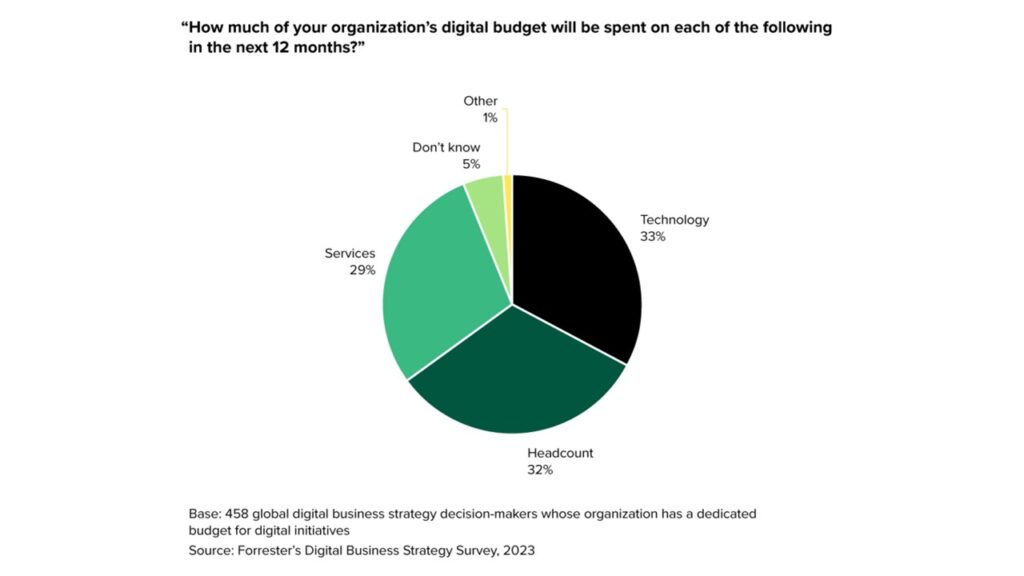Digital technology and skills are critical for digital business success. This is why nine in 10 organizations have a dedicated budget for digital initiatives and why digital budgets are growing for every industry. But in economically challenging times, digital leaders must allocate their budgets wisely. They need to ensure access to the resources required to develop and defend their competitive advantage and to achieve their strategic objectives. Working with the right service providers, prioritizing critical skills, and leveraging technology is key to staying competitive and continuously adapting to customer needs.
In 2023, Forrester surveyed 505 digital business strategy decision-makers globally on their priorities, investments, and organizational structures. We leveraged this data for three related reports on digital budgets, outsourcing, and talent and skills. Our main findings are that:
- Multiple people own the digital budget, necessitating better alignment on priorities. The 2023 Digital Budget Benchmarks, Global report highlights that, on average, organizations spent $221 million on digital initiatives over the past 12 months. Digital budgets are also growing despite — or because of — economic uncertainties. In 63% of cases, multiple people/functions own the digital budget, which is spread across tech, services, and headcount. While businesses with strong digital growth spend slightly more on tech than they do on services and headcount, the divided ownership requires organizations with shared budgets to ensure alignment around customer outcomes and strategic priorities.
- Leaders invest more in internal development. To plug skill gaps, organizations with a digital strategy/initiatives as their primary driver of growth prefer to develop employees internally, while laggards aim to poach talent from competitors. The State Of Digital Skills In 2023 highlights that most digital leaders believe they have the skills they need to execute on their strategy, but only about 50% of digital teams have the recommended digital competencies. Digital laggards in particular show big gaps in their digital competencies. Skill gaps in digital teams will widen due to rising employee turnover. Where businesses can’t develop the right talent or redeploy talent internally, they need to either hire talent externally or work with service providers to plug the gaps.
- Digital teams rely on service providers for a wide range of functions. The report How Digital Teams Work With Service Providers underlines that digital teams spend 29% of their budget on services, similar to what they spend on technology and headcount (see chart). Digital experience and data and analytics service providers are the top partners for digital teams. Digital contractors from service providers are more prevalent in less regulated industries. Interestingly, organizations with above-average growth rely more on digital services, yet only a tenth of digital business strategy professionals say that they plan to outsource various digital competencies. Firms must ensure knowledge transfer from service providers and build in-house expertise to minimize dependencies.

It’s the combination of allocating resources effectively, developing a skilled workforce, and partnering with leading service providers that enables businesses to stay ahead. For more detailed analysis of Forrester’s Digital Business Strategy Survey, 2023, results — including country and sector variations — check out our reports, 2023 Digital Budget Benchmarks, Global, The State Of Digital Skills In 2023, and How Digital Teams Work With Service Providers. You may also schedule an inquiry with us.








